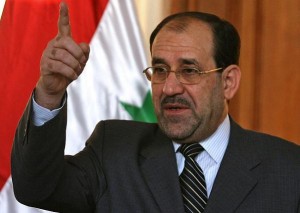 Prime Minister Nuri al-Maliki is expected to announce a partial lineup of posts in Iraq’s national-unity cabinet, keeping the security jobs for himself until a deal is reached with groups that opposed him in elections, according to some members of his bloc in parliament.
Prime Minister Nuri al-Maliki is expected to announce a partial lineup of posts in Iraq’s national-unity cabinet, keeping the security jobs for himself until a deal is reached with groups that opposed him in elections, according to some members of his bloc in parliament.
Al-Maliki “will go to parliament this afternoon to present his government, without the security portfolios, which include defense, interior and national security,’’ the government spokesman, Ali al-Dabbagh, said in a telephone interview from Baghdad. Oil Minister Hussain al-Shahristani and Foreign Minister Hoshyar Zebari will remain in the posts, he said.
Lawmakers won’t vote on al-Maliki’s choices today, Speaker Usama al-Nujafi said in an interview without elaborating. Disagreements about the distribution of posts are holding up completion of the nominations, which may be delayed beyond today, said Hussein al-Assadi, a lawmaker in al-Maliki’s group.
Months of political paralysis and disputes followed the March 7 parliamentary vote, which produced no clear winner. A new government would begin to take office as the U.S. prepares to pull out its remaining troops by the end of 2011. The Iraqi leadership will have to deal with violence, a struggling economy and long-standing disputes over internal boundaries and rights to the country’s oil and gas reserves.
The positions that have been decided on comprise more than half the cabinet, said Sherwan al-Waili, national security minister and a member of al-Maliki’s parliamentary bloc.
Deadline Approaches
Discussions are continuing on whether al-Shahristani should be given the job of deputy prime minister for energy affairs instead of keeping the Oil Ministry role, said Abdul Hadi al- Hassani, a member of al-Maliki’s bloc. Zebari was chosen to retain the Foreign Ministry because he “has proven to be very successful and he is the sole candidate to the position as presented by the Kurdish coalition,’’ he said.
Under the constitution, al-Maliki had 30 days to form a cabinet for his second term in office once President Jalal Talabani asked him to form a government on Nov. 25. The period expires on Dec. 25.
The Shiite Muslim prime minister’s delay in announcing the cabinet reflects difficulties in creating a government that includes all of Iraq’s ethnic and religious groups.
‘Ideological Loggerheads’
“The diverse nature of the new government almost guarantees that it will fail,” the London-based Control Risks Group said in a report before the positions were announced. “The various component parties remain at ideological loggerheads with one another and are unlikely to be able to unite sufficiently to work together.”
Maliki’s State of Law alliance won 89 seats in parliamentary elections on March 7. It merged with former Shiite rivals to form the Iraqi National Alliance afterward, securing a combined total of 159 seats, and was later able to draw in lawmakers from other groups to secure the 163 seats needed for a governing coalition in the 325-seat parliament. BW

Leave a Reply
You must be logged in to post a comment.